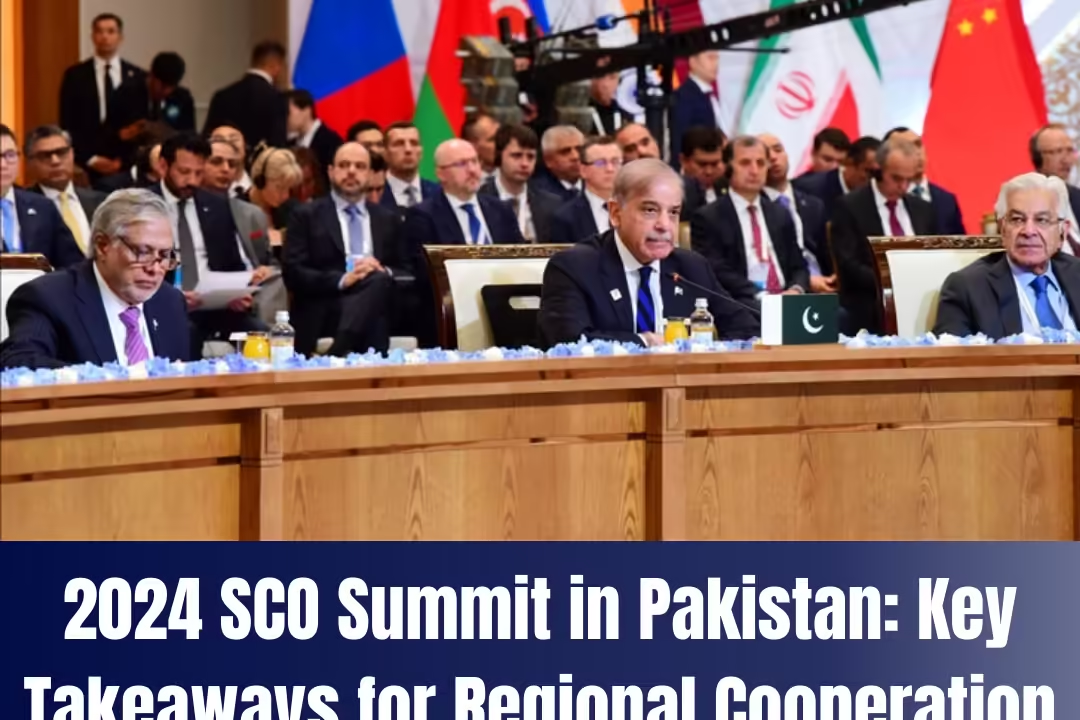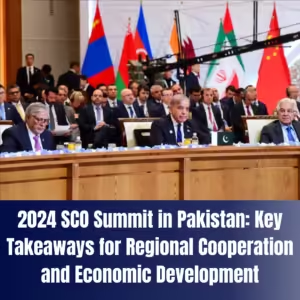
2024 SCO Summit in Pakistan: Key Takeaways for Regional Cooperation and Economic Development

Shanghai Cooperation Organization (SCO) has emerged as a pivotal platform for fostering cooperation among its member states, addressing issues that range from economic development to security concerns. Established in 2001 by the countries of Shanghai-5, which were China, Russia, Kazakhstan, Kyrgyzstan, and Tajikistan, primarily to promote regional stability and security. Over the years, the organization has expanded its membership, which now includes nine member states, covering nearly 80% of the Eurasian landmass and representing 40% of the world’s population. With such significant influence, the SCO plays a crucial role in shaping the geopolitical landscape, especially in the context of rising global uncertainties and economic challenges. The recent summit held in Islamabad on October 15-16, 2024, underscores Pakistan’s active engagement and leadership within the organization.
As the current chair of the SCO Council of Heads of Government, Pakistan played host to the 2024 summit, gathering leaders from member states, including China, Russia, India, and Iran. This gathering signified not just a meeting of minds but also a collective effort to address pressing regional issues through cooperation. Security concerns were paramount, prompting a significant police and paramilitary presence in Islamabad to ensure the safety of approximately 900 delegates. The meticulous arrangements for the summit highlighted Pakistan’s commitment to fostering a secure environment for dialogue and collaboration among member states. This event reflects Pakistan’s desire to enhance its role in regional politics and underscore its capacity to facilitate meaningful discussions on various fronts.
Prior to the summit, Pakistan had already demonstrated its commitment to regional cooperation by hosting several important events. Notably, in November 2023, it organized the Conference on Transport Connectivity for Regional Prosperity, aimed at improving regional trade and transport links. This was followed by an expert-level meeting on poverty alleviation in December, where discussions focused on leveraging digital technologies to enhance social safety nets in SCO member states. These initiatives showcase Pakistan’s proactive approach in addressing challenges that the region faces and highlight its dedication to promoting sustainable development through cooperation and collaboration.
At the 2024 SCO Summit, a range of critical agendas were discussed, all aimed at enhancing regional economic integration. The member states pledged to improve trade connectivity and promote sustainable development, addressing issues such as poverty alleviation and economic disparities.
The summit emphasized the need for cooperation in several areas, including the digital economy, green development, and healthcare. By prioritizing these sectors, the SCO seeks to harness the collective potential of its members and facilitate smoother economic interactions. Furthermore, the discussions aimed to streamline infrastructure projects and enhance transport links across the region, underscoring the importance of connectivity in driving economic growth and development.
The outcomes of the 2024 summit were significant, with a joint communique outlining key commitments by the member states.
The focus on green development, digital economy, and poverty alleviation reflects a shared vision of sustainable growth among SCO members.
Importantly, the member states committed to implementing the SCO Economic Development Strategy through 2030, which aims to optimize the region’s resources for economic and social progress. This commitment not only sets a framework for future cooperation but also emphasizes the importance of collective efforts in addressing pressing challenges. By collaborating on initiatives related to trade, e-commerce, and high technology, the SCO aims to create an environment conducive to economic prosperity and social welfare.
However, the road ahead is not without challenges.
Geopolitical rivalries, particularly between India and China, pose significant hurdles to achieving the SCO’s objectives.
India’s competitive stance towards China and its cautious approach towards Pakistan can hinder cooperative efforts within the organization. The presence of divergent foreign policy interests among member states complicates the dynamics of collaboration. Furthermore, India’s hesitance to fully engage with the SCO, particularly in light of its pro-Western leanings, raises concerns about the organization’s cohesiveness. The ability of the SCO to navigate these complex geopolitical waters will be crucial in determining its effectiveness and relevance in addressing regional issues.
Amidst these challenges, Pakistan’s upcoming leadership roles within the SCO signal a renewed commitment to regional stability and cooperation. From 2025 to 2026, Pakistan will chair the SCO Council of Regional Antiterrorism Structure, focusing on counterterrorism initiatives. Additionally, it will assume the chair of the SCO Council of Heads of State and the Council of Foreign Ministers in 2026-27. These positions present Pakistan with the opportunity to advocate for regional cooperation and work towards mitigating security threats. By leveraging its leadership role, Pakistan aims to facilitate dialogue and collaboration among member states, fostering a shared understanding of security challenges and promoting collective action.
The 2024 SCO Summit also provided a platform for member states to address pressing global trade issues. The joint communique expressed concerns over protectionist measures that undermine the multilateral trading system, particularly in the context of developing nations. The SCO members voiced their commitment to promoting a non-discriminatory and equitable trade environment, emphasizing the need for a transparent multilateral trading system based on World Trade Organization (WTO) principles. This stance highlights the SCO’s role as a voice for emerging economies, advocating for fair trade practices that can benefit all member states. By championing these principles, the SCO seeks to create a conducive environment for economic growth and development in the region.
Furthermore, the summit served as a platform for promoting global unity and cooperation. Member states proposed a resolution for the United Nations General Assembly centered on the SCO initiative “On World Unity for a Just Peace, Harmony, and Development.” This initiative aims to foster new types of international relations grounded in mutual respect and cooperation. The emphasis on creating a “community of common destiny” reflects the SCO’s commitment to building a more inclusive and cooperative global framework. By advocating for dialogue and collaboration, the SCO seeks to navigate the complexities of global politics and establish a foundation for peace and stability.
In conclusion, the 2024 SCO Summit in Islamabad marked a significant milestone in Pakistan’s engagement with regional and global issues. By hosting this summit, Pakistan has demonstrated its commitment to fostering cooperation among SCO member states and addressing critical regional challenges. The summit’s focus on economic integration, sustainable development, and counterterrorism underscores the importance of collaboration in achieving shared goals. However, geopolitical rivalries pose challenges that must be navigated carefully to ensure the effectiveness of the SCO. As Pakistan takes on leadership roles in the coming years, it has the opportunity to advocate for regional stability and cooperation, pushing forward initiatives that can benefit all member states. The success of the SCO in addressing regional challenges will depend on the willingness of its members to set aside differences and work towards mutual cooperation. With a collective commitment to sustainable development and regional prosperity, the SCO can pave the way for a brighter future for its member states and the broader region.
Admin at The Pakistan Gazette

